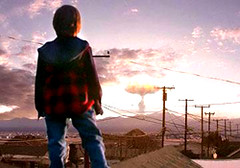As part of my study of human capital a few years ago, I tapped insights from a fast growing company called Direct TV. At the time, Direct TV was simply known as a company to watch. Today, it is the largest provider of DTH digital television services and the second largest provider in the multi-channel program distribution industry in the United States.
What Direct TV understood then, and still does today, is that even "soft" employee programs foster better communication. While social media was barely a blip on the radar of communication, it doesn't take much to see how what was being done then could be reinforced with the tools we have today.
"Fifty to 75 percent of our employees at the corporate office attend every program," said Caroline Leach, ABC, then senior manager of employee communication for Direct TV (now vice president of communications for Direct TV). "Typically, we host them at noon or late in the day. Sometimes it's a recognition program or simply coffee and donuts with executives. They help maintain our family-oriented, entrepreneurial style."
While some companies will always remain skeptical of employee programs, Direct TV found they worked well in moderation. Specifically, they connect employees to management, exposing people to different departments they had no contact with, and generate new ideas. The programs were augmented by a well-defined, integrated employee program, strong benefits packages, and performance incentives.
"Measurement is key to understanding what your employees want," Leach said. "For example, we survey employees electronically after every company broadcast, which gives us an immediate response to how well the information was received. The surveys are anonymous, which empowers the employees to give us candid feedback."
From a broader perspective, the company's (then eight years old; now 13) strategy was simple. The executive team communicated the top one to four quarterly goals to each department while managers were charged with translating these goals into terms that individual employees can apply.
At the same time, employees were empowered to be part of the decision-making process. After the company implemented quarterly bonuses (based upon earlier satisfaction with annual bonuses), employees evaluated and eventually requested an annual bonus over four quarterly bonuses.
The reason in 2002: because Direct TV is an industry with seasonal growth, non-performing quarters (without bonuses) were found to be disheartening and counterproductive to the overall success of the company. The old adage "success produces success" stands.
"Employees also prefer to get most of their information direct from supervisors," said Leach. "We try to augment any communication with face-to-face communication. Our president's day breakfast with 8-10 employees, for example, has a powerful ripple effect throughout the company when the employees return to their departments and share highlights."
Flash forward to today and it is not difficult to imagine how internal social media might have been employed to augment such proven internal communication practices. In fact, it demonstrates something that we've offered up here on several occasions. If 8-10 employees can create a powerful ripple effect throughout a company after a single breakfast with decision makers, imagine what 800-1,000 readers might do after reading an authentic executive post where they can engage the executives by asking a few questions on an Intranet. Hmmm... virtual coffee and donuts with that many more in attendance.
In addition, through such online interaction, companies might be better equipped to solve a growing problem for many businesses (according to an article in the Harvard Business Review, which I'll be writing about later this week) and that is developing a talent factory to fill what seems to be an ever-shrinking pool of strategic thinkers.
Sure, I doubt social media will ever replace face-to-face communication as the most powerful tool in the communicator's arsenal, but it stands to reason that more companies will find unique internal communication methods that demonstrate social media will become the second most trusted source of information within a company (assuming the company does not over-propaganda it).
And, if it can work within a company to provide a bird's eye view to keep departments up to speed, then what is the difference between an internal social network or one consisting of loyal consumers? Virtually none at all.

What Direct TV understood then, and still does today, is that even "soft" employee programs foster better communication. While social media was barely a blip on the radar of communication, it doesn't take much to see how what was being done then could be reinforced with the tools we have today.
"Fifty to 75 percent of our employees at the corporate office attend every program," said Caroline Leach, ABC, then senior manager of employee communication for Direct TV (now vice president of communications for Direct TV). "Typically, we host them at noon or late in the day. Sometimes it's a recognition program or simply coffee and donuts with executives. They help maintain our family-oriented, entrepreneurial style."
While some companies will always remain skeptical of employee programs, Direct TV found they worked well in moderation. Specifically, they connect employees to management, exposing people to different departments they had no contact with, and generate new ideas. The programs were augmented by a well-defined, integrated employee program, strong benefits packages, and performance incentives.
"Measurement is key to understanding what your employees want," Leach said. "For example, we survey employees electronically after every company broadcast, which gives us an immediate response to how well the information was received. The surveys are anonymous, which empowers the employees to give us candid feedback."
From a broader perspective, the company's (then eight years old; now 13) strategy was simple. The executive team communicated the top one to four quarterly goals to each department while managers were charged with translating these goals into terms that individual employees can apply.
At the same time, employees were empowered to be part of the decision-making process. After the company implemented quarterly bonuses (based upon earlier satisfaction with annual bonuses), employees evaluated and eventually requested an annual bonus over four quarterly bonuses.
The reason in 2002: because Direct TV is an industry with seasonal growth, non-performing quarters (without bonuses) were found to be disheartening and counterproductive to the overall success of the company. The old adage "success produces success" stands.
"Employees also prefer to get most of their information direct from supervisors," said Leach. "We try to augment any communication with face-to-face communication. Our president's day breakfast with 8-10 employees, for example, has a powerful ripple effect throughout the company when the employees return to their departments and share highlights."
Flash forward to today and it is not difficult to imagine how internal social media might have been employed to augment such proven internal communication practices. In fact, it demonstrates something that we've offered up here on several occasions. If 8-10 employees can create a powerful ripple effect throughout a company after a single breakfast with decision makers, imagine what 800-1,000 readers might do after reading an authentic executive post where they can engage the executives by asking a few questions on an Intranet. Hmmm... virtual coffee and donuts with that many more in attendance.
In addition, through such online interaction, companies might be better equipped to solve a growing problem for many businesses (according to an article in the Harvard Business Review, which I'll be writing about later this week) and that is developing a talent factory to fill what seems to be an ever-shrinking pool of strategic thinkers.
Sure, I doubt social media will ever replace face-to-face communication as the most powerful tool in the communicator's arsenal, but it stands to reason that more companies will find unique internal communication methods that demonstrate social media will become the second most trusted source of information within a company (assuming the company does not over-propaganda it).
And, if it can work within a company to provide a bird's eye view to keep departments up to speed, then what is the difference between an internal social network or one consisting of loyal consumers? Virtually none at all.



















